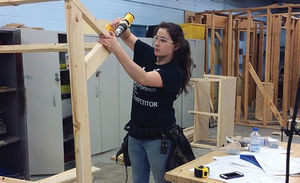The Many Paths To A Fulfilling Health Care Career
Student Perspective It’s all too common that young people interested in a career in health care find themselves pushed, overtly or subconsciously, towards medical school without considering the vast wealth of other rewarding health careers.
For every doctor in Canada, there are about six nurses, not to mention the great many medical laboratory technologists, lab assistants, health administrators, and support workers who keep our world-class health care system running smoothly.
Nursing is a passport
Nursing, particularly, is a rewarding field all its own. “Nursing enables you to be part of the journey of people’s lives in a much more intense way than doctors are able,” explains Doris Grinspun, CEO at the Registered Nurses Association of Ontario. “It’s a profession that is inspiring. It inspires you and inspires those that you care for. It’s a profession that requires brains, heart, and action. It’s a profession that is well-remunerated and allows you to move from specialty to specialty or even from country to country. Nursing is a passport.”
There is also Ontario’s Nursing Graduate Guarantee program to consider, which funds job placements for new graduates from nursing programs. “Upon graduation you are guaranteed not only employment, but full-time employment,” says Grinspun. “In what other profession do you have that?”
“If a student knows they have a love of science and that they love the equipment and instrumentation, I tell them to look into laboratory technology.”
Not in any other profession and not in any other jurisdiction, it would seem.
The magic of the laboratory
And then there are the laboratory technicians and technologists, who are responsible for much of the behind-the-scenes science in the health care system. “If a student knows they have a love of science and that they love the equipment and instrumentation, I tell them to look into laboratory technology,” says Christine Nielson, CEO at the Canadian Society for Medical Laboratory Science. “It’s a career that’s portable across Canada, and we have members working in 140 countries.”
Aging population and retiring health care professionals
Job security, job portability, and career opportunities are a common thread across all health care professions, and that thread is only going to strenghten as we begin to feel the double whammy of Canada’s aging population. A great many baby boomer health care workers are on the cusp of retirement, with 25 percent of medical laboratory technologists expected to retire in the next two years. At the same time, this aging and well-informed population is already causing a dramatic increase in the demand for health care services.
“When we founded Medicare across our provinces just over 50 years ago, the average age of a Canadian was 27, while today it is 47,” says Dr. Samir Sinha, Director of Geriatrics at Mount Sinai Hospital and the Provincial Lead for Ontario’s Seniors Strategy. “While the patients have changed, our health care and education systems have not kept pace, and now we are seeing the impacts of this.”
Our society needs more young people entering every stripe of health care careers. And those who do so will be rewarded not only with a stable, fulfilling, portable, and well-remunerated career, but also with the opportunity to do good in this world on both the grand and the personal stage.
New education opportunities for health care professionals
There is very good reason why most hospitals and health organizations prefer to have personnel with front-line health care experience in their management and administration positions. But, at the same time, the challenges of administration are very different from the challenges of nursing or laboratory technology.
Practical learning
Fortunately, colleges are increasingly offering practical degrees and certifications in Health Administration designed for working health care professionals. In addition to Masters programs, there are also programs, which are open to professionals without a university level degree. “It’s designed for the full range of health care professionals,” says Dr. John Conrad, Associate Dean of the School of Business at St. Lawrence College. “They can come in with whatever experience they have in health care and we will help them take that context and apply business concepts to it, focusing on applied leadership and applied management.”
For those looking to make the transition into management and administration, programs like these provide a welcome path forward.





.jpg)















